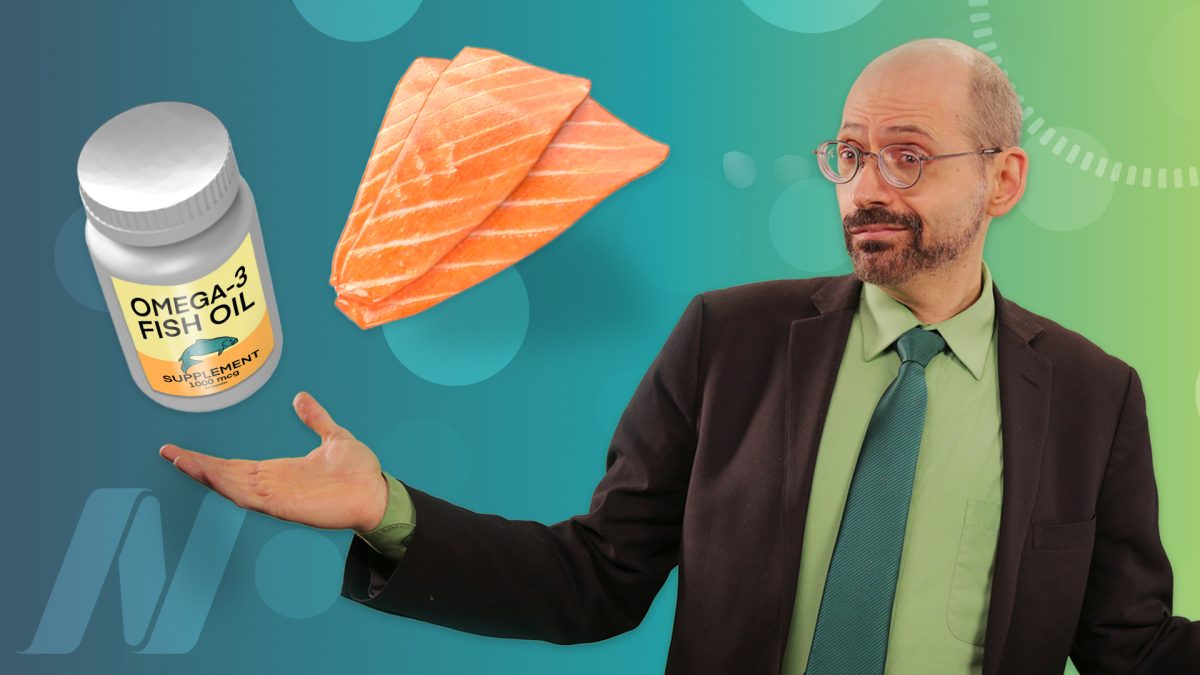
Omega-3 Fatty Acids
According to two of the most credible nutrition authorities, the World Health Organization and the European Food Safety Authority, we should get at least a half a percent of our calories from the short-chain omega-3 ALA. That’s easy: My Daily Dozen recommendation for one tablespoon of ground flaxseeds takes care of that. Our body can then take that short-chain omega-3 and elongate it into the long-chain omega-3s EPA and DHA found in fish fat.
Why not supplement with omega-3 fish oil or just eat fish, though?
Fish oil pills have grown into a multibillion-dollar industry, thanks in part to the American Heart Association’s recommendation that individuals at high risk for heart disease should ask their physicians about omega-3 fish oil supplementation. But what does the science say?
A systematic review and meta-analysis published in the Journal of the American Medical Association looked at all the best randomized clinical trials evaluating the effects of omega-3 fats on life span, cardiac death, sudden death, heart attack, and stroke. These included studies not only on fish oil supplements, but also on the effects of advising people to eat more oily fish. Overall, the researchers found no protective benefit for overall mortality, heart disease mortality, sudden cardiac death, heart attack, or stroke.
After putting all the studies together, researchers concluded there was no longer justification for the use of omega-3s in everyday clinical practice.
Fish oil, even purified (“distilled”) fish oil, has been found to be contaminated with PCBs and other pollutants. The concentration of dioxin-like pollutants in fish oil is so high that when taken as directed, salmon, herring, and tuna oils can cause the average person’s overall daily intake to exceed the tolerable limit of toxicity. This may help explain the studies that found adverse effects of fish consumption on cognitive function in adults and children.
Thankfully, you can get the benefits without the risks by getting long-chain omega-3s from algae instead, which is where the fish primarily get it from to begin with. By getting EPA and DHA directly from the source at the bottom of the food chain, you don’t have to worry about pollutant contamination. In fact, the algae used for supplements are just grown in tanks and never even come in contact with the ocean.
For substantiation of any statements of fact from the peer-reviewed medical literature, please see the associated videos below.
Popular Videos for Omega-3 Fatty Acids


Is Fish “Brain Food” for Older Adults?
Why has fish consumption been associated with cognitive impairment and loss of executive function?
Anti-Inflammatory Diet for Depression
If depression can be induced with pro-inflammatory drugs, might an anti-inflammatory diet be effective in...
Omega 3s, Prostate Cancer, and Atrial Fibrillation
Fish and fish oil consumption do not appear to protect against heart disease, arrhythmias, or...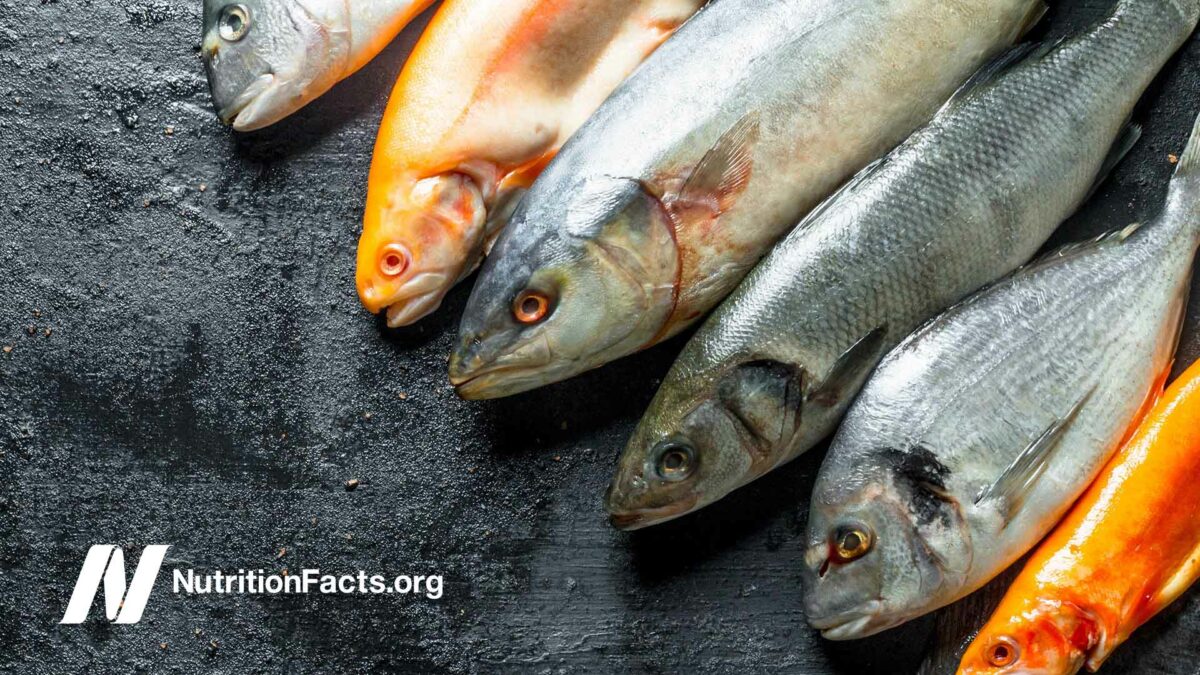
Fish Consumption and Suicide
The mercury content in fish may help explain links found between fish intake and mental...
Fish and Diabetes
The relationship between fish consumption and diabetes risk may be due to toxic pollutants that...
Is Fish Oil Just Snake Oil?
Advice to eat oily fish, or take fish oil, to lower risk of heart disease,...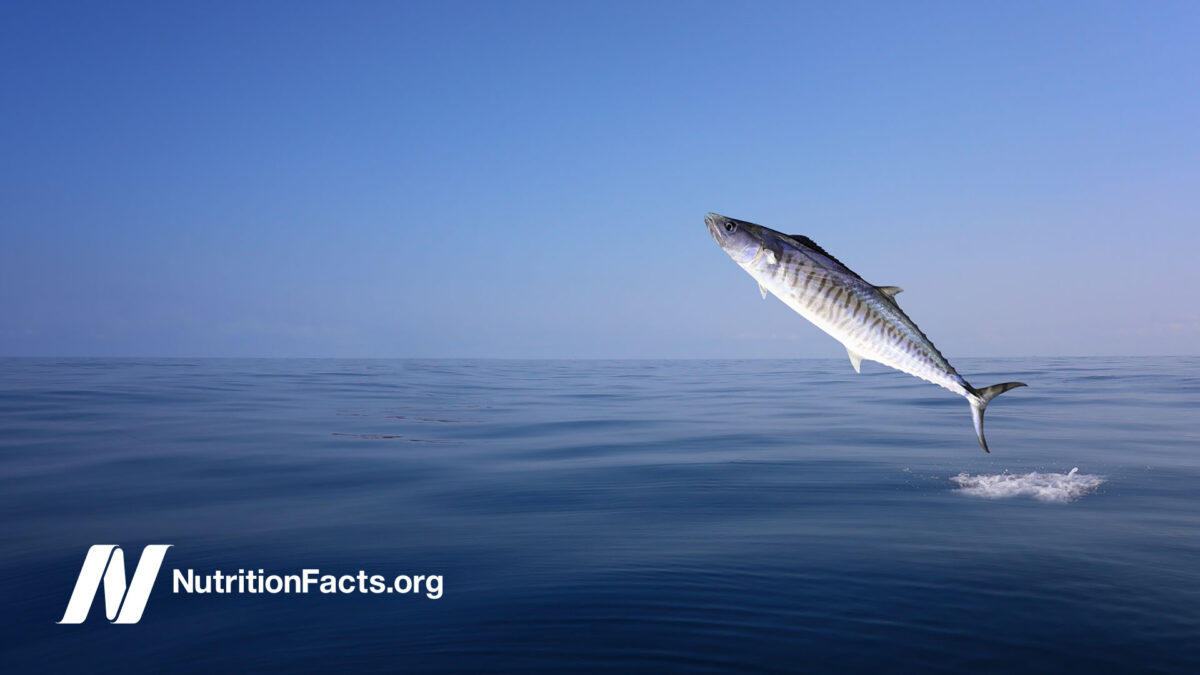
Mercury vs. Omega-3s for Brain Development
Risk/benefit analysis of 33 fish species contrasts the brain-boosting effects of DHA with the brain-damaging...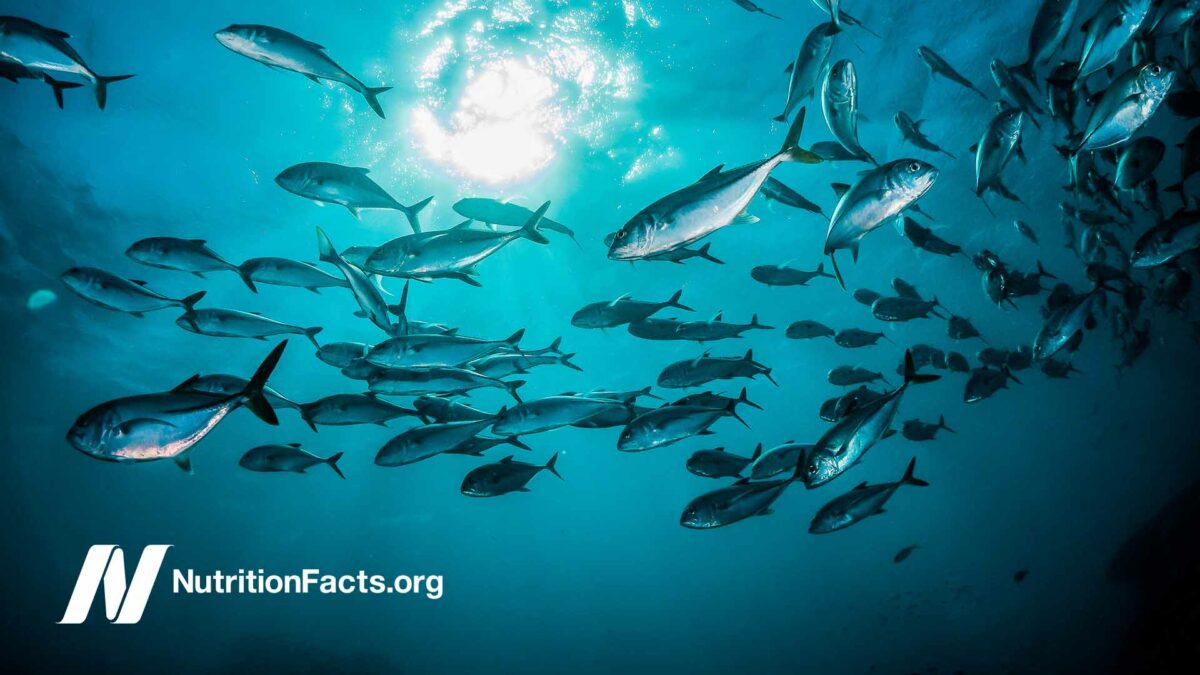
How Long to Detox from Fish Before Pregnancy?
How many months does it take to clear 99% of the mercury and other industrial...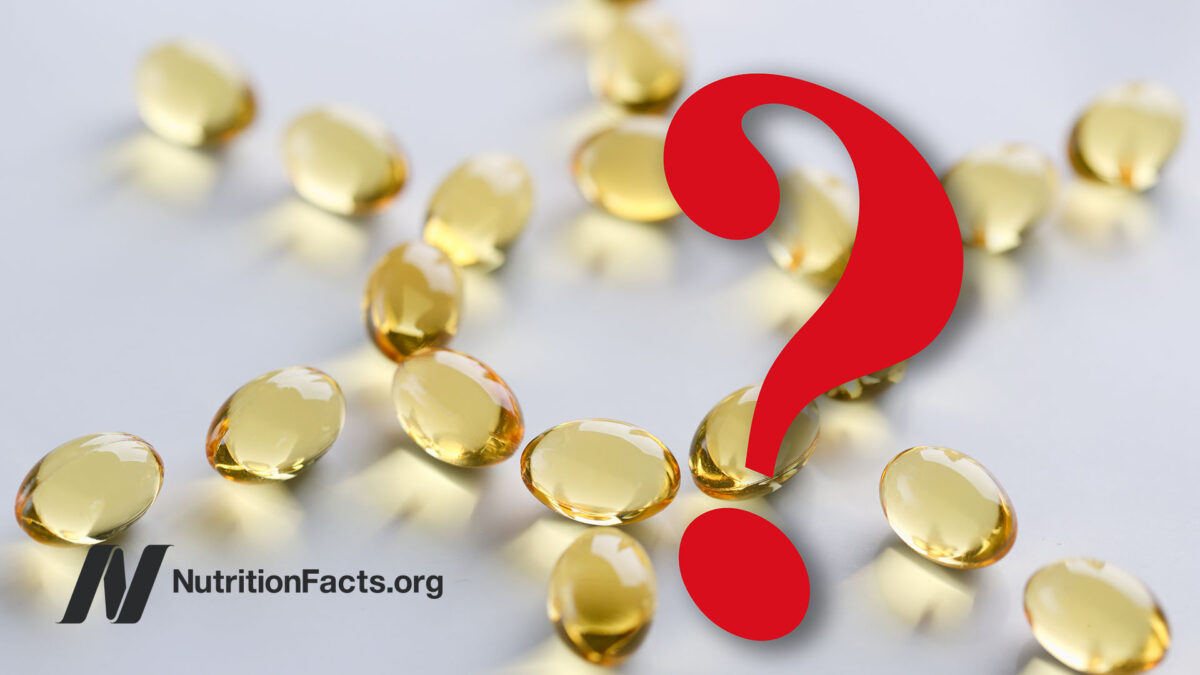
Omega 3s and the Eskimo Fish Tale
The concept that heart disease was rare among the Eskimos appears to be a myth.
PCBs in Children’s Fish Oil Supplements
A study of 13 over-the-counter children’s fish oil supplements found that all were contaminated with...All Videos for Omega-3 Fatty Acids
-

The Highest Antioxidant: Apple, Bean, Berry, Lentil, or Nut?
The best apple, bean, berry, lentil, and nut are the ones you’ll eat the most of; but if you don’t have a strong preference, which has the highest antioxidant power?
-

Supplements for Sarcopenia (Age-Related Muscle Loss)
HMB, magnesium, omega 3s, and vitamin D are put to the test for muscle strength and function.
-

Are Fish or Fish Oil Supplements Good for the Heart?
Five massive new trials have been published recently, randomizing tens of thousands to various formulations of fish oil versus placebo.
-

Do Vitamin D Supplements Help Prevent Diabetes, Cancer Mortality, and Overall Mortality?
Randomized interventional trials are necessary to establish cause-and-effect.
-

How Not To Age – Live Presentation
In this live lecture, Dr. Greger offers a sneak peek into his latest book, How Not to Age, a New York Times Best Seller.
-

Plant-Based Pregnancy Outcomes and Breast Milk
The composition of breast milk is compared between vegetarian and nonvegetarian women.
-

Vegetarians and Stroke Risk Factors—Omega 3s?
Does eating fish or taking fish oil supplements reduce stroke risk?
-

What Are the Best Foods?
A review of reviews on the health effects of animal foods versus plant foods.
-

Benefits of Flaxseeds for Inflammation
Elevated levels of pro-inflammatory, aging-associated oxylipins can be normalized by eating ground flaxseed.
-

Dietary Supplements for Autism
Vitamin C, vitamin D, and omega-3 fish oil supplements put to the test to improve the core symptoms of autism spectrum disorder.
-

Do Chia Seeds Help with Belly Fat?
The secret to unlocking the benefits of chia seeds may be grinding them up.
-

The Best Diet for Fibroids
The same diet that helps regulate hormones in women may also reduce exposure to endocrine-disrupting pollutants.
-

Which Are Better: Chia Seeds or Flaxseeds?
What effect do chia seeds have on weight loss, blood sugar, cholesterol, blood pressure, and inflammation?
-

Should Vegans Take DHA to Preserve Brain Function?
Learn why I recommend 250mg a day of a pollutant-free source of long-chain omega-3 fatty acids.
-

Should We Take DHA Supplements to Boost Brain Function?
Overt omega-3 deficiency is rare, but do short-term experiments on cognitive function suggest there might be an optimal DHA dose?
-

Is Fish “Brain Food” for Older Adults?
Why has fish consumption been associated with cognitive impairment and loss of executive function?
-

Vinegar and Artery Function
Sprinkling vinegar on greens may augment their ability to improve endothelial function.
-

Should Vegan Women Supplement with DHA during Pregnancy?
I recommend all pregnant and breastfeeding women follow the consensus guidelines to get about 200mg of preformed DHA from a pollutant-free source.
-

Should Pregnant and Breastfeeding Women Take DHA?
Does maternal supplementation with the long-chain omega-3 fatty acid DHA improve psychomotor, mental, visual, or physical development of infants?
-

Plant-Based Diets and Artery Function
The improvement of arterial function on a whole food, plant-based diet appears so pronounced that cardiac patients can achieve a 90% reduction in angina attacks.
-

Should We Take EPA and DHA Omega-3 for Our Heart?
What’s the best way to fulfill the omega-3 essential fat requirements?
-

Omega 3s and the Eskimo Fish Tale
The concept that heart disease was rare among the Eskimos appears to be a myth.
-

Anti-Inflammatory Diet for Depression
If depression can be induced with pro-inflammatory drugs, might an anti-inflammatory diet be effective in preventing and treating mood disorders?
-

Omega 3s, Prostate Cancer, and Atrial Fibrillation
Fish and fish oil consumption do not appear to protect against heart disease, arrhythmias, or sudden death, but why would they increase cancer risk?
-

Fish Consumption and Suicide
The mercury content in fish may help explain links found between fish intake and mental disorders, depression, and suicide.
-

PREDIMED: Does Eating Nuts Prevent Strokes?
A randomized controlled trial found that a Mediterranean-type diet can dramatically lower the risk of subsequent heart attacks. How does it compare with plant-based diet data?
-

The Mediterranean Diet or a Whole Food Plant-Based Diet?
A randomized controlled trial found that a Mediterranean-type diet can dramatically lower the risk of subsequent heart attacks. How does it compare with plant-based diet data?
-

The Role of Diet in Declining Sperm Counts
The ongoing global drop in male fertility may be associated with saturated fat intake and lack of sufficient fruits and vegetables.
-

PCBs in Children’s Fish Oil Supplements
A study of 13 over-the-counter children’s fish oil supplements found that all were contaminated with PCB pollutants.
-

Lifestyle Medicine Is the Standard of Care for Prediabetes
Lifestyle modification is considered the foundation of diabetes prevention. What dietary strategies should be employed, and why don’t more doctors use them?
-

Fish and Diabetes
The relationship between fish consumption and diabetes risk may be due to toxic pollutants that build up in the aquatic food chain.
-

Is Fish Oil Just Snake Oil?
Advice to eat oily fish, or take fish oil, to lower risk of heart disease, stroke, or mortality is no longer supported by the balance of available evidence.
-

How Long to Detox from Fish Before Pregnancy?
How many months does it take to clear 99% of the mercury and other industrial toxins from one’s body, and what role might our fat stores play in holding on to fat-soluble pollutants?
-

Mercury vs. Omega-3s for Brain Development
Risk/benefit analysis of 33 fish species contrasts the brain-boosting effects of DHA with the brain-damaging effects of mercury, to determine the net effect on intelligence (IQ).
-

Eggs and Choline: Something Fishy
Too much choline—a compound concentrated in eggs and other animal products—can make bodily secretions smell like rotting fish, and may increase the risk of heart disease, due to conversion in the gut to trimethylamine.
-

Flaxseeds for Sensitive Skin
Instead of treating sensitive skin topically, with lotions and creams, why not treat it from the inside out—with diet?
-

Optimal Phytosterol Source
Whole food sources of phytosterols, such as seeds and nuts, are likely superior to supplements, or phytosterol-fortified spreads and beverages.
-

A Fine Kettle of Fluoxetine
Excreted pharmaceutical drugs, such as Prozac, can end up polluting our waterways, and may bioaccumulate in fish flesh.
-

Preventing Childhood Allergies
What is responsible for the rising prevalence of atopic diseases, such as food allergies, asthma, hay fever, and eczema?
-

Fish Oil in Troubled Waters
Major fish oil manufacturers and drug stores are being sued for failing to disclose the PCB pollutants in fish oil supplements.
